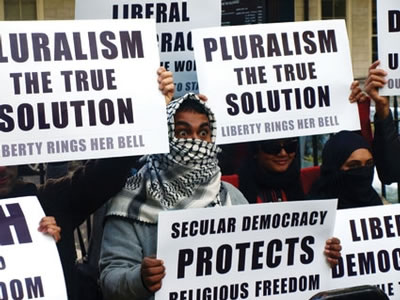
If we turn now to the intellectual manifestations of fanaticism and extremism, one should note that a fanatic will only become an extremist, or risk turning into a terrorist, when he convinces himself of his message and its sanctity. By doing this it becomes easier for him to convince others that he is the bearer of a message to guide humanity and save the world from injustice. This is nothing other than some compensation for his cancelled-out humanity and self.
BY KARAM KHALIL
THE EXTREMIST IS a preacher and a missionary, one who is committed to the salvation of souls and bearer of the keys to heaven. Daʽwā and preaching form the core and strength of extremism and the main engine for its growth and spread. This is because the constant impulse of the human being is towards his salvation and the attainment of happiness, whether in this life or in among the gardens of eternity, as religious systems stamp them.
As a consequence, the ideological mindset – the Islamist one included – has failed to change the reality of life for Arabs, even despite the waning of traditional nationalist and secular ideologies, and the meteoric rise of the Islamic trend through its direct engagement. This trend has not gone on to produce new visions and perceptions or political projects. The continued existence, effectiveness and emergence of Islamist movements, for all their relative success compared to others, are closely linked to the fact that Arab society is a majority Muslim society, one that interacts with Islam and Islamic discourse. Yet this interaction and effective ability to win in democratic elections cannot conceal or explain away its loss of geopolitical vision, and consequently its inability to achieve this vision on the ground.
This is because the ability of this trend to play a direct and practical role in forging the future of the region depends on an ability to present these political perceptions for the future, and on a capacity to disentangle the nexus between them and religious faith. Islam is the society’s religion and is thus a matter for scholars and religious jurists, and then for individual Muslims. But when it comes to political parties, their business is politics.
The solution lies in catching up with developed countries and revolutionizing the stagnant status quo in our society. This can only be done through secularism
We can all understand the historical conditions that led to the phenomenon of ‘political Islam’ and appreciate the role played by the Islamist movements and parties in preserving an identity for the Nation, with the great efforts that they have made. But any understanding of the historical justifications for this phenomenon cannot justify it functioning with the same mindset and instrumentalisation of politics for the reality of the life we are living now.
Islamic political forces must therefore decide whether they are to be a religious group or a political party. For the ‘religious group’ is the Muslim community itself, and no small organisation, no matter how illustrious, can stand in for this group. This is especially the case since the phenomenon of anti-religion hostility has receded, and not even the representatives of competing ideological currents argue about the identity of Arab society; they simply content themselves with raising some issues of human rights, or of related civil and social problems arising from contemporary circumstances. Representatives of the Islamic trend must similarly offer answers to these problems.
From this we can see that fanaticism and religious extremism cannot form a panacea for what society is suffering today, nor can religious political movements and parties provide any solutions. Rather, the solution lies in catching up with developed countries and revolutionizing the stagnant status quo in our society which is preventing it from maximising its latent capabilities and creativity. This can only be done through secularism.
Secularism, as an idea, is the separation of religion from the state. This does not mean the rejection of religion, because secularism is about preserving religion and its ideological practices, but without their entering into the management of people’s affairs or the imposition of any specific religious faith upon them when it comes to the transactions and laws of the state. This is because the state changes in step with changes in the living conditions of the people. Religion cannot do this since it is something fixed, and that which is fixed cannot rule that which is variable.
Secularism is a positive neutrality practiced by the state towards all of its citizens, and in managing the state the secular perspective does not contradict the vision of Islam. The reason for this is that, in Islam, the state is not a religious matter but rather a product of society designed for the good management and policies of the community “whose affairs are a matter of counsel”.[1]
Hence, we can show how Islam, a religion with a billion and a half adherents, is innocent of the terrorism practiced in its name, but it is an unfortunate fact that many Muslim shaykhs, Sunnī or Shīʽa, are not innocent of terrorism’s crimes, especially the famous shaykhs who are stars of satellite channels that issue incitements against all their opponents. If this small extremist faction that is intolerant of values of principles bears no relation to religious faith or Islam in anything other than name, is it right to hold a billion and a half people responsible for the crimes of hundreds or even thousands of madmen? Clearly not, otherwise that would be a similar madness.

Suggested Reading
As for the inciting shaykhs and jihadists and their satellite channels and platforms, these are accomplices to a crime against humanity and against Islam itself. They are the ones who must be held accountable, the carnage and strife they are responsible for exposed, and every extremist thought that seeks to consolidate ignorance and the enslavement of people confronted. For we are not inferior to anyone else, neither in knowledge nor in intellect. How can we therefore fail to revolt against ideas, beliefs, factions and individuals who link religion with the state and its affairs, like some ‘ass bearing books’ [2] which it cannot benefit from or allow others to benefit from?
[1] Qur’ān XLII (al-Shūrā) 38.
[2] Qur’ān LXII (al-Jumʽa), 5: “The likeness of those who are entrusted with the Law of Moses, yet apply it not, is as the likeness of the ass carrying books.”
Read Part 1 of this essay here

